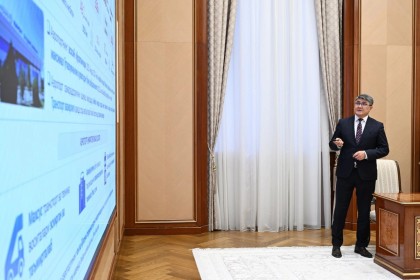The Legislative Chamber passed draft Guarantees for protection of deposits in banks Bill in the first reading at its session on Tuesday, the press service of the lower house said.
The development of the document was envisaged by the annual state program as part of the 5-year New Uzbekistan for 2022-2026 Startegy. The draft was due to be completed in October 2023.
The document, developed jointly with World Bank experts, provides for a reform of the guarantee system for deposits by individuals and its alignment with international standards.
World Bank experts studied the deposit guarantee system in Uzbekistan for compliance with international standards. 8 out of 16 basic principles of an effective deposit insurance system cannot be implemented under the current rules, their report states.
The report mentions problems with the full protection of deposits by the Deposit Guarantee Fund. Because of this, individuals seek to invest money at a high interest rate, “without seekng in the financial condition of the bank and operational risks.”
While, the Xalq Bank, which serves the largest number of individual clients, uses state guarantees. This negatively affects the competitive environment in the financial services market, international experts noted.
The amendments proposed to abandon the full (100%) deposit guarantee. This system was introduced in Uzbekistan in 2009 to mitigate the effects of the economic crisis that was observed at that time. This mechanism was also temporarily introduced in other countries, but to date, out of 108 countries, only Uzbekistan, Turkmenistan and Belarus have retained the full deposit guarantee.
In other countries, the maximum amount of compensation for a bank deposit has been established: in Kazakhstan - in the equivalent of 43 thousand dollars, Azerbaijan - 17.7 thousand dollars, in Russia - 15.4 thousand dollars, Turkey - 14 thousand dollars, and in the EU countries - up to 100 thousand euros.
In Uzbekistan, the maximum amount is proposed to be set at no more than 200 million soums (about 15.9 thousand dollars) for one depositor in one bank, including for businesses (legal entities). That is, a depositor can count on a guarantee of payment of up to 200 million soums for each deposit in different banks (for example, up to 7 billion soums when placing deposits in 35 banks).
The analysis found that this amount covers 99.7% of depositors' funds in banks. According to financial analyst Otabek Bakirov, this is a correct figure, but the problem is that all large deposits are concentrated in the hands of a small number of depositors.
"Unfortunately, several thousand depositors own a significant part of the deposits in Uzbekistan. Had the Central Bank published this information, it would have been clear to everyone. The completely outdated guarantee system, which has not changed for 16 years, guaranteed the deposits of billionaires, not small and medium-sized depositors, encouraged concentration rather than competition, and fostered risk aversion among large depositors,” he said.
The new compensation amount will not apply to deposits opened before the law came into force. That is, the full system of guaranteeing existing deposits will be preserved, regardless of their amount.
Meanwhile, the definition of such a limit does not relieve banks from civil liability; they will still be liable to clients with their assets and property. That is, 200 million soums will be covered by the state, and the depositor can demand the rest from the bank.
Now the agency will switch from the PayBox to PayBox+ (there are also "loss minimizer" and "risk minimizer"). If the deposit insurer is currently only responsible for paying insurance compensation on insured deposits, it will now have additional responsibilities, such as certain functions of insolvency resolution, in order to prevent possible crises in banks.
According to the MPs, the adoption of this bill will ensure the stability of the banking system, preserve the funds of the population and businesses, allow them to conduct their business "without fear of losing funds in the event of bank closures", and most importantly, "strengthen public confidence in the banking system".
Otabek Bakirov also proposed introducing a provision so that individuals have the opportunity to transfer funds from their cards and deposits to their cards and deposits in other banks without fees (this is technically possible thanks to connection to PINFL). This should help reduce "stress after the law takes effect and boost competition for deposits between banks."
The draft must now be reviewed in the second and third readings in the lower house of parliament, and then sent to the Senate for approval.














